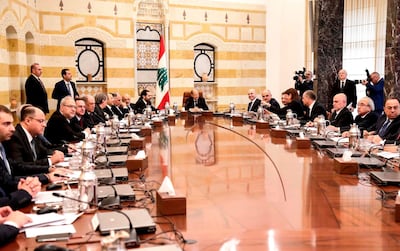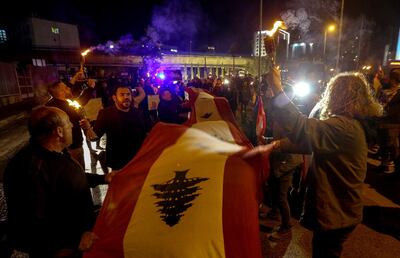The Lebanese aspect of the US-Russian, US-Iranian and Iranian-Israeli balance of power is extremely delicate. The long-awaited formation of a Lebanese government could be an indication that there is an international consensus to stop Lebanon from becoming a fully fledged failed state, and to block attempts to turn it into an active military arena for either Iran or Israel. The formation of the government led by Prime Minister Saad Al Hariri came after a nine-month delay that brought the country close to the brink of disaster. In the end, the prospect of collapse forced all Lebanese political players to make concessions to avoid being blamed for catastrophe.
Lebanese politicians and leaders have long engaged in mutual trickery, manoeuvering and one-upmanship to secure sectarian shares, financial gains and foreign sponsorship. Today, some are even rushing to reinvite Syrian regime tutelage, believing the world has conceded Bashar Al Assad’s victory, while others are objecting to the hasty attempt at normalisation with Syria and refuse the humiliating prospect of restored Syrian hegemony over Lebanon.
Lebanese politicians often cite the “special nature” of their administration, as if expecting the world to adapt to, and accommodate, its flaws. This is the excuse when it comes to Hezbollah’s arms, which exist outside the state’s authority and legitimacy. Some politicians use this to push back against pressures demanding they take action and stop their prevarication and obfuscation. However, some do accept that justification because past experiences with Hezbollah have brought Lebanon to the brink of civil war because of a balance of power heavily skewed in the group’s favour.

Hezbollah’s ranks are divided between a faction in favour of leveraging its power to dominate Lebanon and its institutions, and a realist faction that is taking stock of the regional and international position of Iran and Hezbollah, including the painful impact of economic sanctions, isolation and increasing accusations of terrorism. That latter faction is closely watching the evolution of Russian-Israeli relations, the decline of Russian-Iranian relations and the implications for the fate of the Iranian project and Hezbollah in Lebanon. They are watching European powers making half-promises to Iran, anticipating the practical implications for the sanctions on Hezbollah’s finances and concluding that they are backed into a corner. It is this faction in Hezbollah that has sought breathing space, believing Mr Al Hariri, their former foe who accuses their party of assassinating his father Rafik al-Hariri, is their safety net today.
Remarkably, an editorial in the pro-Hezbollah Al Akhbar newspaper asked: “Can Mr Al Hariri go so far as to ignore Washington’s messages and defuse attempts to encircle Hezbollah, through a government in which the party has a weighty share?”
Hezbollah, it claimed, wants Mr Al Hariri to be its safety net against US sanctions and international justice and for the prime minister to defend it even if it decides to escalate in the south, to lead the efforts in re-establishing relations with the Syrian regime, and to protect it as an organisation.
In truth, this suggests Hezbollah is operating from a position of weakness, not strength. But it is being framed to Hezbollah’s base as Mr Al Hariri serving the party and its priorities, thus making it look like an achievement, not a compromise, for the group. Such discourse is also meant to frustrate Mr Al Hariri’s own base, by making it seem like he acts at Hezbollah’s discretion. Moreover, it is intended to drive a wedge between Mr Al Hariri and the Gulf countries as well as the US.
A source close to the prime minister highlighted what he termed Hezbollah’s “transition from the [rhetoric] of overwhelming victory and defeat of America…to seeking the help of others and using Mr Al Hariri as a lifeline”.
The source, however, cast doubt on Hezbollah’s expectations, saying Mr Al Hariri would “protect the country and its economy but not Hezbollah’s networks...He will protect the country by committing to international transparency standards, Lebanon’s external obligations, implementing Lebanese and international anti-money laundry laws, and co-ordinating with the US Treasury”.
US assistant secretary for terrorist financing Marshall Billingslea visited Lebanon’s leaders in the days leading up to the formation of the government and met a number of bankers, economists and journalists. His message was that the US did not want Lebanon’s economy to collapse and that it was committed to supporting it, as long as the Lebanese are on board too. However, he stressed that his government will not stop prosecuting Hezbollah until its funding sources are dry.
Regarding Hezbollah taking over Lebanon's Ministry of Health, Mr Billingslea said if the US government sees the group trying to exploit the ministry's resources to finance itself or fund activities in support of its "terrorist agenda", the administration would consider that a big problem. He added the US authorities had already dismantled financial networks associated to Hezbollah in West Africa and was pursuing all those providing financial support for Hezbollah chief Hassan Nasrallah. He said the sanctions on Iran have heavily impacted Hezbollah and left it in financial crisis and vowed pressure on the organisation would continue and increase in the coming days.
Richard Grenell, US ambassador to Berlin, is closely watching European governments and companies to counter any violation of US sanctions on Iran. That includes any company or entity seeking to circumvent the sanctions through the new Instex trade vehicle established by Britain, France and Germany. Mr Grenell has proven his determination to see this effort through, earning a lot of criticism and enemies in Berlin and beyond.
However, he understands the issue well as he had served previously in the US mission to the UN in New York. According to one US official, “any government that attempts to circumvent sanctions will risk facing sanctions itself”.
The impact of US sanctions on Iran and Hezbollah are clear in both Tehran and Beirut. But corruption and under-the-table deals between Lebanon’s political players have made a mockery of the country’s institutions and caused financial hardship to Lebanese citizens.
Political accords and vague promises of reform are therefore not enough to rescue Lebanon from economic collapse. The fate of Lebanon is in the hands of its rulers, leaders and ministers, not just at the whims of international and regional accords, as some would have us believe.



